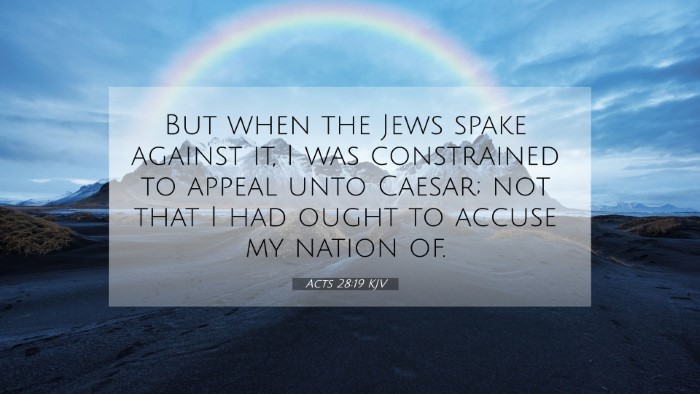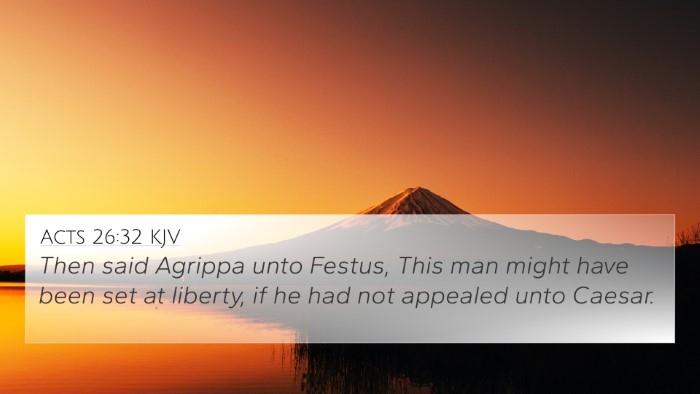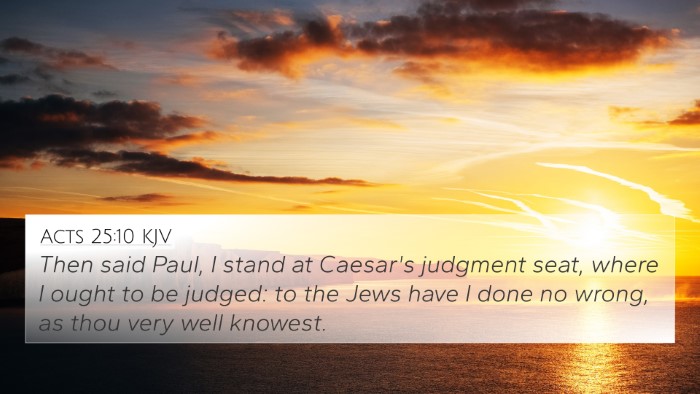Understanding Acts 28:19
Acts 28:19 states: "But when the Jews spoke against it, I was forced to appeal to Caesar; not that I had any charge to bring against my nation." This verse serves as an important transition in the narrative of Acts, depicting St. Paul's appeal to authority in light of opposition from the Jewish leaders.
Contextual Significance
In the larger context of the book of Acts, Paul has been a pivotal figure in spreading the Gospel. His arrest and subsequent trials showcase the tension between emerging Christianity and traditional Judaism. The commentary on this verse underlines several important themes:
- Paul's Faithfulness: Despite facing significant backlash, Paul remains steadfast, illustrating his commitment to proclaiming the Gospel.
- The Role of Roman Authority: Paul makes a strategic decision by appealing to Caesar, highlighting the interplay between religion and governance.
- Jewish Opposition: The verse reflects the growing division between early Christians and Jewish authorities, an essential part of Acts' narrative.
Commentary Insights
Different commentaries provide rich insights into this verse:
- Matthew Henry: Emphasizes Paul's wise choice in appealing to Caesar as a way to ensure his safety and further the mission of the Gospel despite opposition.
- Albert Barnes: Points out that Paul's appeal was not out of desperation but a strategy, to continue his mission in a context where he could be heard.
- Adam Clarke: Discusses the implications of Paul’s statement regarding his nation, stressing the importance of misunderstanding and misrepresentation faced by the early Church.
Cross-References and Thematic Connections
Acts 28:19 draws connections with several other Bible verses that explore themes of persecution, faith in authority, and divine mission.
Relevant Cross-References
- Romans 13:1-2: Discusses the Christian's relationship to governing authorities, suggesting that they are established by God.
- Philippians 1:12-14: Paul reflects on his imprisonment and how it served to advance the Gospel, resonating with his appeal to Caesar.
- Acts 25:11: Paul states his right to appeal to Caesar, showcasing the legal context that supports his decision.
- Matthew 10:16-20: Jesus prepares His followers for persecution, similar to Paul's situation amidst the Jewish opposition.
- 2 Timothy 4:16-17: Paul's reflections on his defense in the face of opposition echo his sentiments expressed in Acts 28:19.
- 1 Peter 3:15: Encourages believers to always be ready to give an answer, reflecting Paul's commitment to defending his faith.
- Acts 21:21-24: Illustrates the tension between Paul and the Jewish leaders earlier in his ministry.
Conclusion
Acts 28:19 is a microcosm of the broader themes in the book of Acts, reflecting the early Church's struggles and the strategic approaches of its leaders. Through understanding this verse with supportive commentaries and relevant cross-references, readers can grasp the complex inter-Biblical dialogues and contextual significances tied to early Christian history.
Further Study: Inter-Biblical Connections
For those interested in exploring how Acts 28:19 connects with other scripture, consider utilizing tools for Bible cross-referencing and a Bible concordance. These resources can significantly aid in identifying connections between Old and New Testament scriptures and facilitate deeper Bible study.
Recommended Tools for Cross-Referencing
- Bible Concordance: A resource that lists words and phrases throughout the Bible for quick reference.
- Cross-Reference Bible Study Guides: Materials that help in systematically exploring scripture connections.
- Bible Reference Resources: Various books and online platforms offering extensive scripture analysis.
- Cross-Referencing Methods: Techniques such as thematic studies and parallel analysis for more profound insights.








